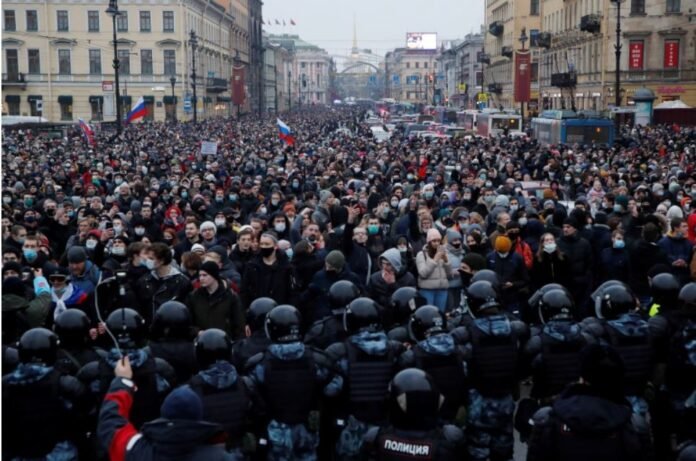
Russian police have detained over 1,000 people across Russia and used force to break up rallies around the country as tens of thousands of protesters demanded the release of Kremlin critic Alexei Navalny, whose wife was among those detained.
Navalny had called on his supporters to protest after being arrested last weekend as he returned to Russia from Germany for the first time since being poisoned with a nerve agent he says was applied to his underpants by state security agents in August.
The authorities had warned people to stay away from Saturday’s protests, saying they risked catching COVID-19 as well as prosecution and possible jail time for attending an unauthorised event.
But protesters defied the ban and bitter cold and turned out in force.
In central Moscow, where Reuters reporters estimated at least 40,000 people had gathered in one of the biggest unauthorised rallies for years, police were seen roughly detaining people, bundling them into nearby vans.
The authorities said just some 4,000 people had shown up.

Police in the Siberian city of Yakutsk, one of the coldest cities in the world and where the temperature was -52C on Saturday, grabbed a protester by his arms and legs and dragged him into a van, video footage from the scene showed.
In Moscow, police put up barricades around Pushkinskaya Square as workers were engaged in re-tiling it, an apparent attempt to thwart a demonstration that was scheduled to start at 11:00 GMT.
Close Navalny ally Lyubov Sobol, a laywer, was also detained.
Video of the moment when Navalny ally/lawyer Lyubov Sobol is grabbed by riot cops while speaking in Moscow. (Video by @tvrain) pic.twitter.com/dCY0nlLzgi
— Mike Eckel (@Mike_Eckel) January 23, 2021
The OVD-Info protest monitor group said that at least 1,614 people, including 300 in Moscow and 162 in St Petersburg, had been detained across Russia, a number likely to rise.
It reported arrests at rallies in nearly 70 towns and cities.
Anna Matveeva, a researcher at King’s College London, said the wide geographic reach of these protests is important.
“The police is brutal there is nothing new about it,” Matveeva told Al Jazeera.
“But the fact that the geography of protests has spread all the way from Moscow to Western Russia and also in northern states … we are seeing a consistent number of people coming out, knowing that they might be beaten, that they might be detained, that they will have criminal records, and notwithstanding that people are [still] coming out”.
Navalny, an ex-lawyer who has accused President Vladimir Putin of ordering his murder, could face years in jail over legal cases that he calls trumped up. Putin has denied involvement.
The two-hour video report has been viewed more than 64 million times since its release on Tuesday, becoming the Kremlin critic’s most-watched YouTube investigation.
Navalny’s arrest drew widespread Western condemnation, with the United States, the European Union, France and Canada all calling for his release.
Source: Al Jazeera















